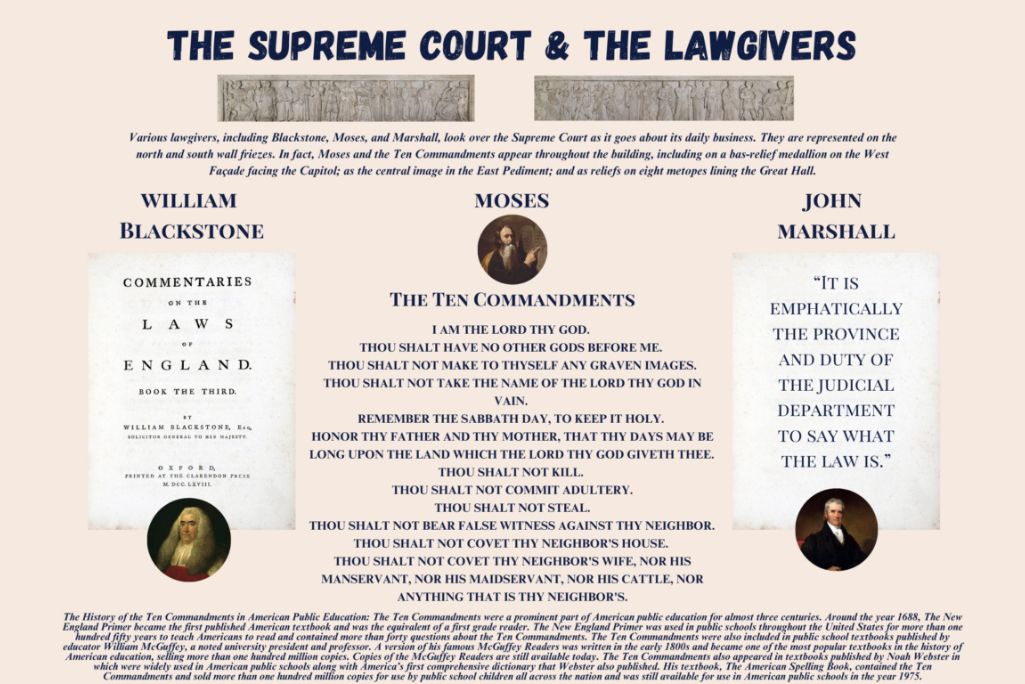
Louisiana Attorney General Liz Murrill gives examples on her website of posters that would fulfill the state's mandate that public schools post the Ten Commandments.
BATON ROUGE, La. (BP) — Louisiana Attorney General (AG) Liz Murrill has advised school boards on how to comply with the state’s law requiring public classrooms to display the Ten Commandments, despite a federal district judge’s November 2024 ruling declaring the law unconstitutional and prohibiting its enforcement.
Murrill told school boards in 59 parishes that Judge John deGravelles’ ruling only applies to the five parishes that sued the state over the law’s legality. In her Jan. 3 letter, Murrill did not acknowledge the law had been declared unconstitutional “in all applications.” Instead, she stated the law “is plainly constitutional because there are constitutionally sound ways to implement it.”
Plaintiffs who successfully blocked the law’s enforcement notified school superintendents in a Jan. 6 letter, calling Murrill’s guidance “misleading,” reminding them of the facts of the case and urging them to respect the federal court ruling, which Murrill has appealed. The next court date is set for Jan. 23.
“The AG’s guidance claims that all school boards, except for the five school-board defendants in the Roake case, remain obligated to comply with H.B. 71,” wrote the plaintiffs, including Americans United for Separation of Church and State, the American Civil Liberties Union (ACLU) of Louisiana, the ACLU and the Freedom From Religion Foundation. “Even though your district is not a party to the ongoing lawsuit, and therefore is not technically subject to the district court’s injunction, all school districts have an independent obligation to respect students’ and families’ constitutional rights.
“Because the U.S. Constitution supersedes state law, and because a federal district court has ruled H.B. 71 is unconstitutional under the First Amendment, public-school officials may not comply with it.”
Murrill acknowledged part of deGravelles’ ruling in a footnote to her letter.
“In an ongoing lawsuit, five parish school boards — St. Tammany, Livingston, East Baton Rouge, Orleans, and Vernon — are enjoined from implementing H.B. 71,” Murrill wrote. “My office has appealed that ruling to the Fifth Circuit, which will hear oral argument on Jan. 23. While that injunction remains in effect, those five parishes may not implement H.B. 71. But that injunction does not govern the remainder of our parish school boards, as well as all other public schools, which remain obligated to comply with H.B. 71.”
Similar bills failed in Texas and Oklahoma in 2024, but Oklahoma Rep. Jim Olsen has refiled his bill this legislative session to display the Ten Commandments in public schools and secured a first reading in February. Texas lawmakers have also expressed plans to give their bill another round.
Louisiana’s H.B. 71, signed into law by Gov. Jeff Landry in June 2024, required a specified Protestant version of the Ten Commandments to be displayed in all public schools in Louisiana by January 2025.
The law applied to all public elementary, secondary and postsecondary schools, from kindergarten through college, and mandated a version of the Ten Commandments different from the one used by Catholics, who make up 26% of the state’s adults, second only to the 27% of evangelical Protestants, according to the Pew Research Center’s Religious Landscape Study. However, the law does not apply to Catholic schools.
In addition to the plaintiffs mentioned, nine families, including Christian pastors, Jewish leaders and others, filed a lawsuit challenging H.B. 71.
“The court finds that House Bill No. 71, Act No. 676, is facially unconstitutional and unconstitutional in all applications,” deGravelles ruled. He prohibited the state from enforcing the law, adopting rules or regulations for its enforcement or requiring the Ten Commandments to be posted in public school classrooms in Louisiana in accordance with H.B. 71.
DeGravelles also ordered Louisiana State Superintendent of Education Cade Brumley and the Board of Elementary and Secondary Education to notify all Louisiana public elementary, secondary and charter schools, as well as all public postsecondary educational institutions, of the law’s unconstitutionality.
(EDITOR’S NOTE — Diana Chandler is Baptist Press’ senior writer.)


